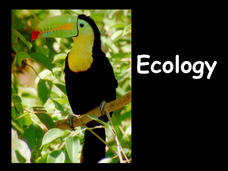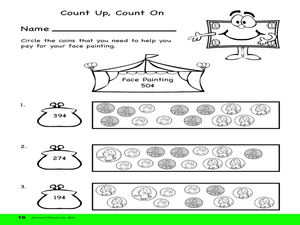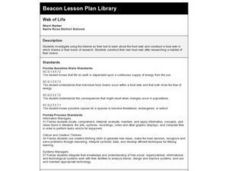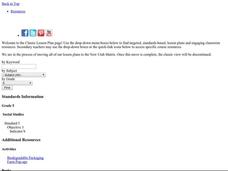NASA
Planning Time
Ever feel there's just not enough hours in the day? Young adults explore an important part of personal development using a group of activities. After comparing how they actually spend their time with how they would like to, scholars...
PBS
The Lorax
Accompany a reading of Dr. Seuss' tale, The Lorax, with a five-item instructional activity. Questions challenge scholars to list characters' names, use text details to answer inquiries, and describe the moral of the story.
Biology Junction
Ecology
Psychologists study human relationships while ecologist study relationships between organisms in the environment. An introduction to ecology and the related vocabulary benefits scholars as they progress through the presentation and...
College Board
2018 AP® Environmental Science Free-Response Questions
Less than nine percent of all AP Environmental Science test takers scored a perfect five on the exam in 2018. Learn from the best answers as well as the common mistakes thanks to the College Board. Four questions from the test covering...
Purdue University
Mammal Food Webs
You are what you eat—or at least a part of what you eat. Budding scientists examine owl pellets to develop their own food webs. They use tooth and skull identification techniques to classify what they find.
University of Waikato
Build a Marine Food Web
Dive into a lesson on marine ecosystem interactions. Individuals learn about and devise a marine food web. The resource provides organism cards and pupils use article resources to discover interactions before modeling them in a food web.
Curated OER
Counting Change and Changing Coins
Second graders demonstrate how to count change. In this consumer math activity, 2nd graders read the book The Penny Pot and identify the value of coins. Students complete a worksheet to practice counting coins.
Curated OER
Market Day Adventure
Second graders participate in the Market Day project. They produce goods, market goods, and earn money to buy goods.
Curated OER
Web of Life - Alaska
Seventh graders research Alaska, then construct their own food web after researching a habitat of their choice.
Curated OER
The Chain Gang
Students perform a food chain simulation to determine what happens when a food chain is broken.
Curated OER
Trophic Levels and Food Webs
In this biology worksheet, learners identify and locate various vocabulary terms related to trophic levels and food webs. There are 27 biology terms located in the word search.
Curated OER
Where to shop?
Young scholars study a topic of an environmental nature that is relevant to them (as individuals) on a local level, but with global implications. They consider whether their family's shopping habits have any lasting effects on the...
Curated OER
Inflation and Money
Students define money in terms of its functions and refer back to discussion of markets and the role of money in reducing transaction costs. They give examples of types of money.
Curated OER
Create a Creature
Learners design, build, draw, or bake a creature of their choice and present to the class. They write a paper including the creature's habitat, method of getting energy, their creature as a producer or consumer, predator or prey species...
Curated OER
The Ancient Mediterranean: Trade, Contact, and Cultural Diffusion
Ninth graders begin the lesson by being introduced to the basic terms of economics. In groups, they discover how they are affected by trade because of the clothes they wear and foods they eat. Using primary sources, they examine the...
Curated OER
What is a Food Chain?
In this food chain worksheet, students write in the 3 steps that occur in a basic food chain. This worksheet is a graphic organizer.
Curated OER
Source Search
Fifth graders discover how agriculture affects our daily lives. In this agriculture lesson, 5th graders investigate different products that originate from agriculture. Resources are provided.
Curated OER
Economic Concepts and Definitions
Third graders identify producers and consumers in SE Utah and Four-Corners communities. They identify the factors that determine economic development and name some occupations in their community. They show and share their graphic...
Curated OER
Food Chains and Food Webs
Pupils discuss the characteristics of producers, consumers and decomposers. Using a flow chart, they construct a food chain to visually show how organisms with different energy sources depend upon one another. Students explore a model...
Curated OER
Connect the Species
Fourth graders, in pairs, explore energy transfer and species interrelationships by viewing slides on a microscope. hey explore phytoplankton (producers) and zooplankton (consumers)
Curated OER
Exploring Ecosystems
Fourth graders investigate ecosystems. In this ecosystem lesson, 4th graders explore producers, consumers, and decomposers and study the interdependence of each.
Curated OER
Everyone Up!
Learners examine various agriculture careers, both direct and indirect, related to crop production and distribution. In this food production lesson plan, students role play the processing chain in which crops move from producer to...
Curated OER
Culture Creation vs. Culture Consumption - Finding Voice Through Digital Storytelling
Ninth graders explore the power of media in culture and Gandhi's philosophy of nonviolence. In this nonviolence and media lesson, 9th graders analyze Gandhi's nonviolent methods for social change and discuss the media's power to create...
Curated OER
Population and resources(
Students describe what a consumer is and give examples of how we affect the earth. They explain how we as consumers can change our actions to have less of an impact. Students discuss "How can we reduce the size of our footprint?"
Other popular searches
- Producers and Consumers
- Producers an Consumers
- Producers Consumers
- Science Producers Consumers
- Producers and Consumers Poem
- Marine Producers Consumers
- Producers Consumers Writing
- Producers, Consumers

























